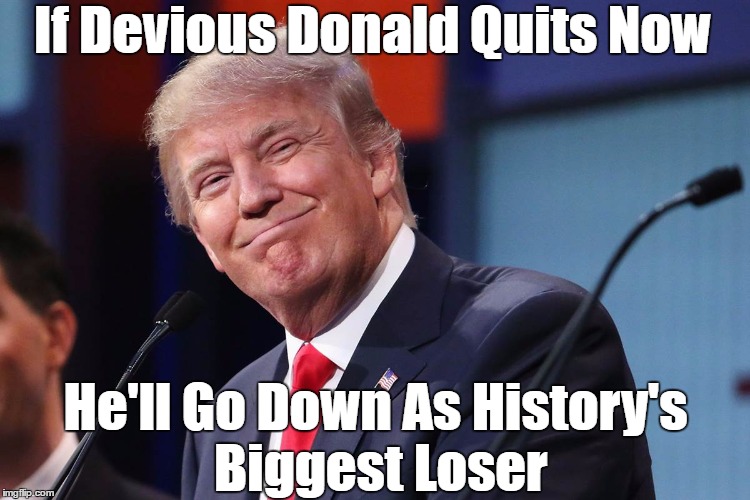Compendium Of Pax Posts About Donald Trump, Updated July 31, 2016
http://paxonbothhouses.blogspo
I Am Your Voice?
That Trump acceptance-speech line may stand for the biggest sellout of a candidate’s supporters in the history of presidential politics.
Excerpt: "The past two weeks have revived the notion that while Mr. Trump doesn’t want the humiliation of a loss, he doesn’t want to be president either. His assertion that the election “is going to be rigged” sounds like someone who is retreating to a personal island, where he’ll spend a lifetime trying to justify what he didn’t do. “I am your voice.” Millions believed Donald Trump. That line is close to standing for the biggest sellout of a candidate’s supporters in the history of America’s presidential politics."
By
DANIEL HENNINGER
166 COMMENTS
Donald Trump’s statement Tuesday that he can’t endorse the re-elections of House Speaker Paul Ryan or 2008 Republican presidential candidate John McCain or New Hampshire Sen. Kelly Ayotte means that Mr. Trump has separated himself from the party that nominated him.
He is essentially running for president the way he ran for the nomination—as an independent candidate inside the shell of one of the two major parties (as did Bernie Sanders). The election’s importance for Supreme Court nominations or control of Congress still holds. But every Republican candidate in a tough race, such as Wisconsin’s Sen. Ron Johnson, is on his own. The party’s nominee has abandoned them.
One now must ask: Will Donald Trump also abandon the voters who have supported him for the past year by failing or even refusing to run a respectable campaign? Will he desert the people who put him in a position to compete for the American presidency?
In his Cleveland acceptance speech, Mr. Trump said: “These are the forgotten men and women of our country. People who work hard but no longer have a voice. I am your voice.” Since Cleveland, Mr. Trump has forgotten the forgotten men and women who stuck with him.
Mr. Trump rose to prominence with an appealing message, make America great again. What he has done since becoming a presidential nominee has had virtually nothing to do with making America great again. Instead, it has been about him, his controversies and his critics.
Think of Mr. Trump’s base of support as a series of concentric circles. The tightest circle includes the people whom Mr. Trump identified when he said: “I could stand in the middle of Fifth Avenue and shoot somebody, and I wouldn’t lose voters.” They will go down with the Trump ship no matter what.
Extending outward from this core are people who looked to Mr. Trump for a path out of their economic anxiety, for leadership and deliverance from the gagged world of political correctness. These people were not low-information voters. Giving their vote to Donald Trump in the primaries was a leap of faith, and they knew it. This is a change election, and he was their change agent.
Donald Trump, the master of the deal, is not holding up his end of the deal. Instead of being their voice, he is acting like a ventriloquist putting on his own one-man show.
It may be true that this election has disrupted almost everything we thought we knew about politics, such as the importance of having boots on the ground to turn out voters in important battleground states such as Ohio, where instead Mr. Trump is alienated from the state’s Republican leadership.
But one political rule that won’t be overturned is that you have to get more votes than your opponent to win. Breakdowns of voting in the primaries show that both Mr. Trump and Hillary Clinton were supported by about 14% of eligible voters. Both need to expand the vote beyond that primary base. The Never-Hillary vote is ripe for such an expansion.
Donald Trump has said that he is redrawing the GOP election map by pulling into the party voters who normally do not vote Republican. They are variously called the new silent majority or Reagan Democrats.
I had an unexpected exchange with one of these voters at La Guardia Airport while checking in to fly to the GOP’s Cleveland convention.
The airline worker was a black woman, probably in her late 30s. Confirming that I was going to Cleveland for the GOP convention, she said: “I really don’t know who to vote for. I’m a Democrat and so was my father. My father’s favorite president was Ronald Reagan.He loved Ronald Reagan. Trump? Maybe. I don’t know. I don’t like the way Trump criticizes everyone all the time. I don’t think that’s right. I don’t know what I’m going to do.” She never mentioned Hillary Clinton.
Donald Trump isn’t turning out new voters. He’s turning them down. Every day, he’s giving voters who might vote for his candidacy reason to abandon both him and the 2016 election.
In March at a rally in Arizona Donald Trump said: “My daughter Ivanka and my wife Melania say, ‘Please, please act a little more presidential,’ and I say, I can’t until I finish my victory.” He said he’d act more presidential when the time called for it. Well?
The past two weeks have revived the notion that while Mr. Trump doesn’t want the humiliation of a loss, he doesn’t want to be president either. His assertion that the election “is going to be rigged” sounds like someone who is retreating to a personal island, where he’ll spend a lifetime trying to justify what he didn’t do.
“I am your voice.” Millions believed Donald Trump. That line is close to standing for the biggest sellout of a candidate’s supporters in the history of America’s presidential politics.
Write to henninger@wsj.com
